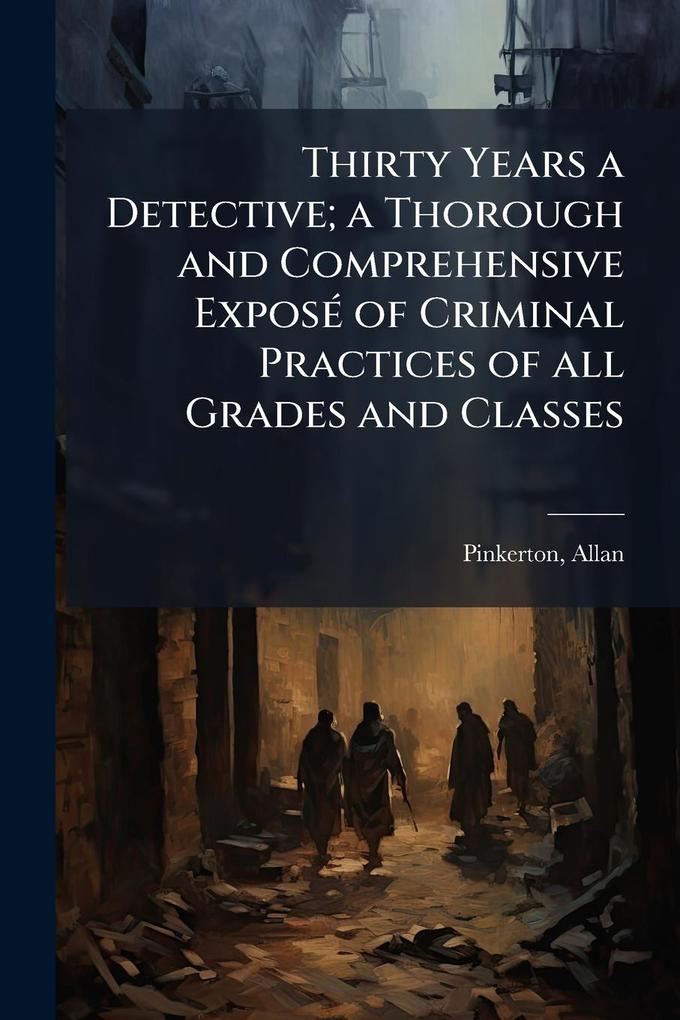
Zustellung: Do, 24.07. - Di, 29.07.
Versand in 2 Wochen
VersandkostenfreiBestellen & in Filiale abholen:
In "Thirty Years a Detective," Allan Pinkerton, the famous founder of the Pinkerton National Detective Agency, recounts his extensive career and provides a detailed look into the world of 19th-century crime and criminal investigation. This book offers a fascinating exposé of criminal practices across various social classes, detailing Pinkerton's experiences with counterfeiters, murderers, thieves, and other nefarious characters. The narrative combines thrilling anecdotes with practical insights into the methods and challenges of detective work during a transformative period in American history.
Pinkerton's firsthand account not only showcases his own contributions to law enforcement but also paints a vivid picture of the social and economic conditions that fostered crime. The book remains a valuable resource for understanding the evolution of criminal justice and the early development of professional detective work. "Thirty Years a Detective" is a must-read for true crime enthusiasts, historians, and anyone interested in the gritty realities of life on both sides of the law in 19th-century America.
This work has been selected by scholars as being culturally important, and is part of the knowledge base of civilization as we know it. This work was reproduced from the original artifact, and remains as true to the original work as possible. Therefore, you will see the original copyright references, library stamps (as most of these works have been housed in our most important libraries around the world), and other notations in the work.
This work is in the public domain in the United States of America, and possibly other nations. Within the United States, you may freely copy and distribute this work, as no entity (individual or corporate) has a copyright on the body of the work.
As a reproduction of a historical artifact, this work may contain missing or blurred pages, poor pictures, errant marks, etc. Scholars believe, and we concur, that this work is important enough to be preserved, reproduced, and made generally available to the public. We appreciate your support of the preservation process, and thank you for being an important part of keeping this knowledge alive and relevant.
Pinkerton's firsthand account not only showcases his own contributions to law enforcement but also paints a vivid picture of the social and economic conditions that fostered crime. The book remains a valuable resource for understanding the evolution of criminal justice and the early development of professional detective work. "Thirty Years a Detective" is a must-read for true crime enthusiasts, historians, and anyone interested in the gritty realities of life on both sides of the law in 19th-century America.
This work has been selected by scholars as being culturally important, and is part of the knowledge base of civilization as we know it. This work was reproduced from the original artifact, and remains as true to the original work as possible. Therefore, you will see the original copyright references, library stamps (as most of these works have been housed in our most important libraries around the world), and other notations in the work.
This work is in the public domain in the United States of America, and possibly other nations. Within the United States, you may freely copy and distribute this work, as no entity (individual or corporate) has a copyright on the body of the work.
As a reproduction of a historical artifact, this work may contain missing or blurred pages, poor pictures, errant marks, etc. Scholars believe, and we concur, that this work is important enough to be preserved, reproduced, and made generally available to the public. We appreciate your support of the preservation process, and thank you for being an important part of keeping this knowledge alive and relevant.
Produktdetails
Erscheinungsdatum
22. Mai 2025
Sprache
englisch
Seitenanzahl
666
Autor/Autorin
Allan Pinkerton
Verlag/Hersteller
Produktart
kartoniert
Gewicht
916 g
Größe (L/B/H)
234/156/34 mm
ISBN
9781024146967
Bewertungen
0 Bewertungen
Es wurden noch keine Bewertungen abgegeben. Schreiben Sie die erste Bewertung zu "Thirty Years a Detective; a Thorough and Comprehensive ExposÃ(c) of Criminal Practices of all Grades and Classes" und helfen Sie damit anderen bei der Kaufentscheidung.









